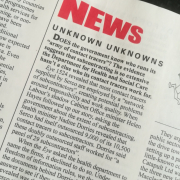UK Government Spends Millions with Consulting Firms – Did Buyers Know What They Were Doing?
UK government procurement related to the pandemic continues to be a source of some concern and confusion. More consulting contracts were published on the Contracts Finder website last week, showing the vast sums of money that are finding their way into the pockets of the partners at major consulting firms.
Deloitte were awarded two further consultancy contracts, via a call off from a Framework Agreement, worth a total of £8.7 million for: “Buy Support for Ventilators – ICU equipment & consumables, ventilator sourcing, hard to source products” (£6.7m) and “Support programme delivery including the identification and procurement of PPE” (£2.2m).
Two other unusual consultancy contracts were awarded to Boston Consulting Group to support the chaotic Test & Trace programme. That represented £4,992,059 for “strategic support” and £4,996,056 for “digital support” (very precise values!)
We don’t know whether there was any competitive process – for those of you who aren’t public procurement experts, you are not allowed to simply choose a “random” or favoured supplier from a “Framework” in most cases without running a competition between firms who are listed on it. Did that happen here? I have my doubts but we don’t know. There have also been comments from within the NHS suggesting that no-one quite knows what Deloitte actually did in terms of ventilator procurement. But hey, it was only £6.7 million.
But there was some good news as well. Gareth Davies, who heads up the UK National Audit Office, was interviewed by the Guardian and amongst other points, he confirmed that a report into government procurement processes during the coronavirus pandemic would be published later this year.
“We’re looking at the procurement process, a lot of public comments and concern about the transparency of some of the procurement contracts around PPE and other areas. We’re doing a detailed piece of work,” he said.
So here are a few of the questions NAO might like to ask the buyers of those consultancy services if they choose to examine that area in particular.
- Did you understand what it was you really wanted to buy?
- Did you consider the market in an appropriate manner, and use competition to arrive at the best fit / best value supplier to meet your needs?
- Do you understand the difference between the three basic reasons or needs behind buying consulting services – specialist knowledge & skills, intellectual horsepower, or execution / implementation capability?
- Did you think about the different commercial mechanisms and models – fixed price, time and materials, target pricing and all the variations? Are you clear you chose the most appropriate for your contract?
- Do you understand the economics of consulting firms and therefore did you use that to negotiate confidently on daily rates (or fixed price)?
- If you didn’t use competition, how did you arrive at a fair price for the work?
- Did you make the deliverables, outputs or outcomes that you were expecting very clear?
- Did you define the contract management process and the interim reporting that you wanted to see from the firm, and then follow through with professional contract management practice?
Let’s hope those responsible for spending money with these firms avoided Bad Buying and can answer these questions confidently and robustly.









Leave a Reply
Want to join the discussion?Feel free to contribute!